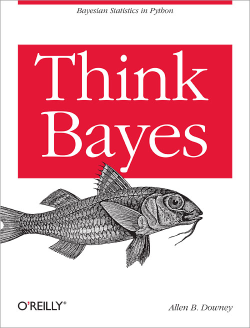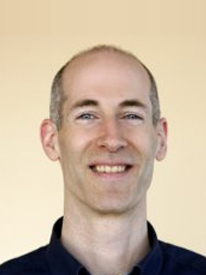
Think Bayes: Bayesian Statistics in Python
An introduction to Bayesian statistics using simple Python programs instead of complicated math.
Tag(s): Python Statistics
Publication date: 04 Oct 2013
ISBN-10: 1449370780
ISBN-13: 9781449370787
Paperback: 210 pages
Views: 15,268
Type: N/A
Publisher: O’Reilly Media, Inc.
License: Creative Commons Attribution-NonCommercial 3.0 Unported
Post time: 02 Apr 2016 04:00:00
Think Bayes: Bayesian Statistics in Python
 An introduction to Bayesian statistics using simple Python programs instead of complicated math.
An introduction to Bayesian statistics using simple Python programs instead of complicated math.
Publication date: 04 Oct 2013
ISBN-10: 1449370780
ISBN-13: 9781449370787
Paperback: 210 pages
Views: 15,268
Document Type: N/A
Publisher: O’Reilly Media, Inc.
License: Creative Commons Attribution-NonCommercial 3.0 Unported
Post time: 02 Apr 2016 04:00:00
Share — copy and redistribute the material in any medium or format
Adapt — remix, transform, and build upon the material
The licensor cannot revoke these freedoms as long as you follow the license terms.
Click here to read the full license.
Allen B. Downey wrote:Think Bayes is a Free Book. It is available under the Creative Commons Attribution-NonCommercial 3.0 Unported License, which means that you are free to copy, distribute, and modify it, as long as you attribute the work and don’t use it for commercial purposes.
From the Description:
Allen B. Downey wrote:Think Bayes is an introduction to Bayesian statistics using computational methods.The premise of this book, and the other books in the Think X series, is that if you know how to program, you can use that skill to learn other topics.Most books on Bayesian statistics use mathematical notation and present ideas in terms of mathematical concepts like calculus. This book uses Python code instead of math, and discrete approximations instead of continuous mathematics. As a result, what would be an integral in a math book becomes a summation, and most operations on probability distributions are simple loops.
Tweet
About The Author(s)
Allen B. Downey (born May 11, 1967) is an American computer scientist, Professor of Computer Science at the Franklin W. Olin College of Engineering and writer of free textbooks. Downey received in 1989 his BS and in 1990 his MA, both in Civil Engineering from the Massachusetts Institute of Technology, and his PhD in Computer Science from the University of California at Berkeley in 1997.

Allen B. Downey (born May 11, 1967) is an American computer scientist, Professor of Computer Science at the Franklin W. Olin College of Engineering and writer of free textbooks. Downey received in 1989 his BS and in 1990 his MA, both in Civil Engineering from the Massachusetts Institute of Technology, and his PhD in Computer Science from the University of California at Berkeley in 1997.